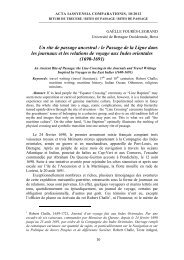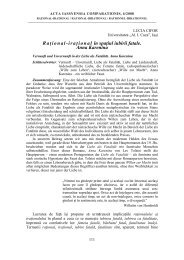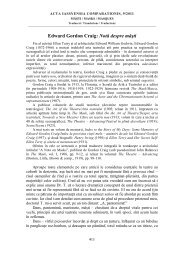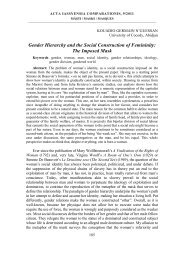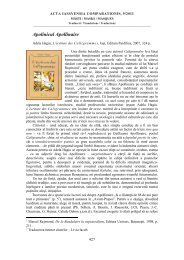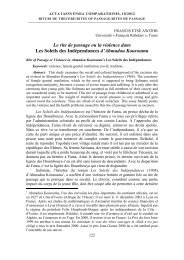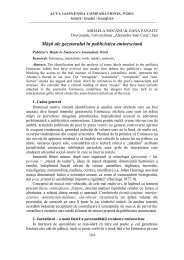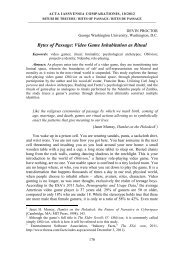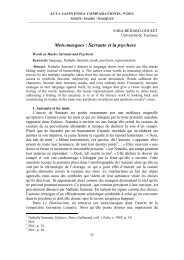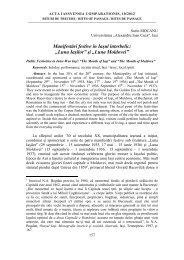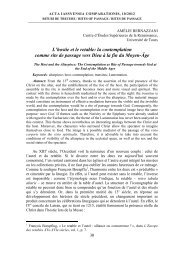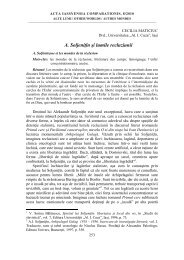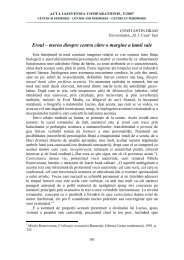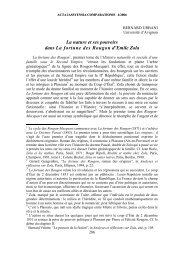Foreign Home and Familiar Abroad in Salman Rushdie's The ...
Foreign Home and Familiar Abroad in Salman Rushdie's The ...
Foreign Home and Familiar Abroad in Salman Rushdie's The ...
You also want an ePaper? Increase the reach of your titles
YUMPU automatically turns print PDFs into web optimized ePapers that Google loves.
ACTA IASSYENSIA COMPARATIONIS, 8/2010<br />
ALTE LUMI / OTHER WORLDS / AUTRES MONDES<br />
________________________________________________________________________________<br />
hav<strong>in</strong>g been understood. As a matter of fact, Salahudd<strong>in</strong> cannot formulate any<br />
reproach to his native country when he leaves it, <strong>in</strong> the same way <strong>in</strong> which what he<br />
admires about London is an assembly of collected images, not the result of a lived<br />
experience. Once mesmerized by the “real pounds” st<strong>and</strong><strong>in</strong>g for the fabled Vilayet,<br />
Salahudd<strong>in</strong> starts anathematiz<strong>in</strong>g “the Bombay of dust, vulgarity, policemen <strong>in</strong><br />
shorts, transvestites, movie fanz<strong>in</strong>es, pavement sleepers <strong>and</strong> the rumoured s<strong>in</strong>g<strong>in</strong>g<br />
whores of Grant Road.” (37) <strong>The</strong> “poise <strong>and</strong> moderation” (37) Engl<strong>and</strong> is<br />
theoretically associated with balances the actual “confusion <strong>and</strong> super-abundance”<br />
of the already estranged Bombay.<br />
Five years after his immersion <strong>in</strong> the unconditionally admired Engl<strong>and</strong>, ‘critical<br />
th<strong>in</strong>k<strong>in</strong>g’ st<strong>and</strong>s as Salad<strong>in</strong>’s newest ability acquired as part of his education,<br />
apply<strong>in</strong>g it to everyth<strong>in</strong>g that spr<strong>in</strong>gs <strong>in</strong> his way dur<strong>in</strong>g the short visit back home. His<br />
Indian home is the place where “the fans are fixed too loosely (…), the food is too<br />
fatten<strong>in</strong>g (…), the top-floor balconies are unsafe (…), we are just jungle people.”<br />
(44) Salad<strong>in</strong>’s adolescent – maybe underst<strong>and</strong>able - revolt rema<strong>in</strong>s unabated as the<br />
process of build<strong>in</strong>g an English identity is <strong>in</strong> progress: his first mature visit home does<br />
not nuance any of his previous radical taunts addressed to everyth<strong>in</strong>g that is Indian,<br />
his alien country be<strong>in</strong>g noth<strong>in</strong>g else than “the old despised disorder. (…) rubble,<br />
litter, noise.” (54) Examples are picked up at a glace: while read<strong>in</strong>g a newspaper,<br />
Salad<strong>in</strong> “neutrally” transfers the <strong>in</strong>formation about a Bombay ‘rail roko’<br />
demonstration which proves Indian police as violent, corrupted <strong>and</strong> demagogic.<br />
On the plane fly<strong>in</strong>g back to Engl<strong>and</strong>, afraid that his speech has been <strong>in</strong>fested with<br />
“the Bombay lilt”, Salad<strong>in</strong> rapidly enumerates all the “diabolic [Indian] humiliations”<br />
he expects to endure: “Would he take to putt<strong>in</strong>g coconut-oil <strong>in</strong> his hair? Would he<br />
take to squeez<strong>in</strong>g his nostrils between thumb <strong>and</strong> foref<strong>in</strong>ger, blow<strong>in</strong>g noisily <strong>and</strong><br />
draw<strong>in</strong>g forth a glut<strong>in</strong>ous silver arc of muck?” (34) All <strong>in</strong> all, Salad<strong>in</strong> rounds off his<br />
journey to India as a negative experience: “regression”, “unnatural”, “denial of time”,<br />
“revolt aga<strong>in</strong>st history”, <strong>and</strong> “the whole th<strong>in</strong>g was bound to be a disaster.” (34)<br />
2.2. Indians’ India<br />
<strong>The</strong> new identity of India consists, <strong>in</strong>deed, <strong>in</strong> <strong>in</strong>authenticity, an amalgam of<br />
borrowed elements, guaranteed by the others’ outside perception, <strong>and</strong> not by the<br />
locals’ <strong>in</strong>side necessary del<strong>in</strong>eation, the loan identity surpass<strong>in</strong>g qualitatively the<br />
real one. Zeeny Vakil, the character who will fall <strong>in</strong> love with Salad<strong>in</strong> Chamcha<br />
after his separation from Pamela, his wife, is the author of <strong>The</strong> Only Good Indian, a<br />
book that perfectly illustrates India’s status: “She was an art critic whose book on<br />
the conf<strong>in</strong><strong>in</strong>g myth of authenticity, that folkloristic straitjacket which she sought to<br />
replace by an ethic of historically validated eclecticism, for was not the entire<br />
national culture based on the pr<strong>in</strong>ciple of borrow<strong>in</strong>g whatever clothes seem to fit,<br />
Aryan, Mughal, British, take-the-best-<strong>and</strong>-leave-the-rest? – had created a<br />
predictable st<strong>in</strong>k, especially because of its title.” (52)<br />
<strong>The</strong> real image of India could be built only as a result of concrete situations or<br />
based on testimonies from with<strong>in</strong> – Bhupen G<strong>and</strong>hi, a close acqua<strong>in</strong>tance of Zeeny<br />
Vakil, narrates the locals’ reaction to the passengers <strong>in</strong>volved <strong>in</strong> a railway disaster:<br />
286



